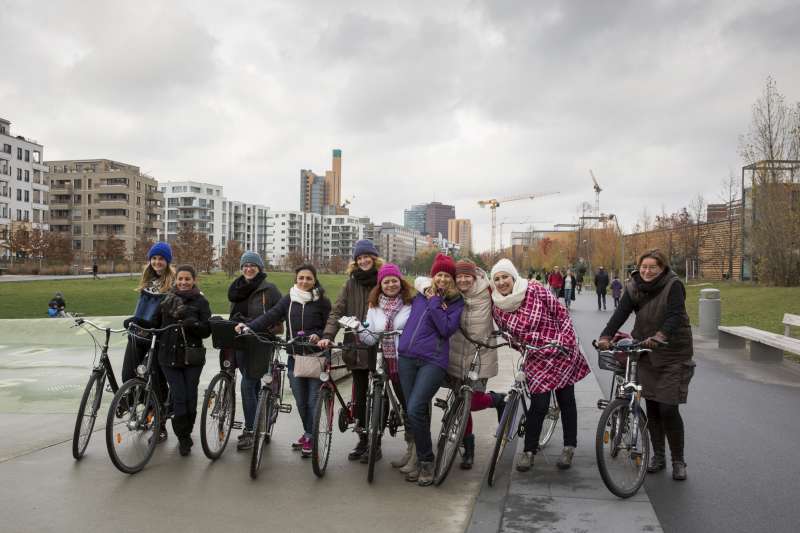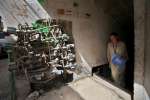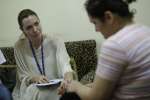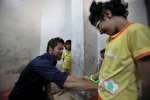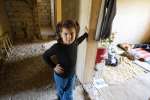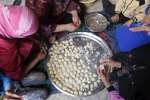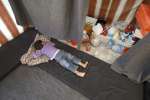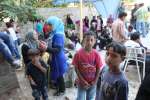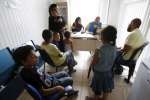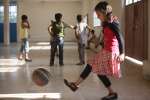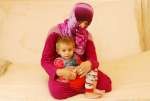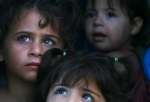New friendships for first-time Syrian cyclists in Berlin
News Stories, 25 November 2015
BERLIN, Nov 24 (UNHCR) – Gripping the handlebars of the unfamiliar, borrowed bicycle, Shiraz peers down at her right foot and places it hesitantly on the raised pedal. Lifting her head, eyes fixed on the wide sweep of park beyond, she glides off as her left leg falls irresistibly into a pedalling rhythm.
At the grand old age of 27, Shiraz, a Syrian asylum-seeker in Germany, was cycling for the first time. It was all thanks to the encouragement of Berlin-based volunteers, who had spent the last four Saturday mornings coaching her on how to get about on two wheels.
"I love how cycling feels," said Shiraz, who fled fighting in Aleppo, northern Syria together with her whole family two months ago. "Today it was great to ride so far around the park. Soon I want to ride along the Berlin streets like the locals."
Shiraz shares two rooms in a large accommodation centre with her mother, father, brother and sister-in-law. For her parents, waiting for their asylum applications to be processed can be frustrating, she said, but the ladies' cycling group has given her a new sense of purpose.
"With this group I feel like I'm starting to know what I'm doing here. There was no life for me in Syria, no future," she said. "My family and I just wanted somewhere safe, where there was peace. In the end we had to leave, we were being bombed. My parents are here with me in Germany so for a moment I feel almost like I have no worries. I'm free to ride a bike if I want."
Germany is a cyclist's dream, and the capital, Berlin, is no exception. The city's wide, flat streets, often flanked by well-marked cycle paths, mean that a bicycle is the transport of choice for many residents. Latest figures suggest that 72 per cent of Berliners have a bike, compared with 35 per cent who own a car.
"Lots of people cycle here and newcomers to the city quickly see that it's an easy way to get around," said Katie Griggs, a 40-year-old Briton who organised the informal cycling sessions after Shiraz and a number of other asylum-seeker friends asked her how they could learn to ride.
"Riding a bike is a matter of independence, it's a kind of liberation in a way," added Griggs, who has been raising money to give group members their own bikes. In the past month she received more than 1,000 euros in donations and has already presented one Syrian woman and her son with a brand new bike each, along with locks and a helmet and support for repairs if needed.
"Everyone learns in a different way, some faster, some slower," she said. "Often it's just about giving someone a bike to hold, touch and walk around with, to get the feeling for it."
Back home in Syria, mostly only young children have bikes, said newbie cyclist Shiraz, who had been studying law when the threat of bombing forced her to flee her home. "It's weird to see a woman on a bike at home," she said. "But then I never dreamed I'd be living here in Germany. I never thought of leaving when I was living a normal life in Syria."
The weekly bike sessions, held in a large, open recreational space in central Berlin, aren't just about learning to cycle. For asylum-seekers like Shiraz and volunteers who donate their bikes and moral support, it's also about forging new connections.
"Of course I miss my home, my university and my friends," said Shiraz. "When you find yourself in a place that isn't safe, there's no time to say goodbye to everyone. But we just have to be patient and wait for a better time when we get to join the German people and be part of the German culture."
"If Syria ever becomes safe again of course I will think about going back – it's home," she added. "But I don't have much hope of that happening soon. The situation gets worse every day. It's seems only a dream that it will ever get back to how it was before."
Yet as Shiraz concentrated on mastering the fine balance, coordination and sheer tenacity needed to stay upright on a bicycle, the nightmare of life in a war zone finally began to seem that bit further away.
For Griggs, who has no previous experience of teaching cycling, there's something intimate about guiding an activity usually reserved for parents and their young children. "It's an amazing feeling," she said. "I'm always quite overcome with emotion. When we had our first session and they were all starting to cycle, I have to say I cried."
"It's always important to have enough helpers – also for cheering!" said Griggs, gesturing at the group of German, British, Icelandic, Swedish, American and Canadian volunteers clapping Shiraz as she cycled past with new-found confidence.
A safe, supportive environment is vital for first-time cyclists, who can feel vulnerable wobbling around on two wheels. Griggs said she'd never set out to make it an all-female group, but that only women had approached her for help. "Even if men have never ridden a bike most of them just seem to have the courage to jump on a bike straight away and are off along the roads," she said.
As temperatures fell, the novice cyclists held their last make-shift class of the year this weekend, the day before Germany saw its first scatterings of snow. But the new friendships won't be neglected over the colder months, with the group planning cooking meet-ups and outings to explore Berlin's many museums.
By Josie Le Blond in Berlin





